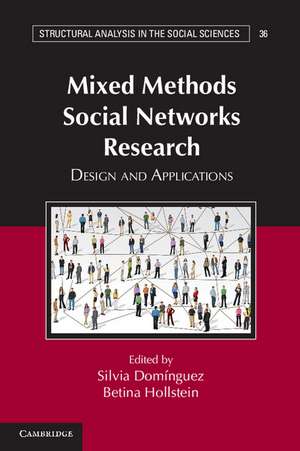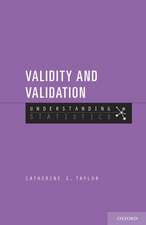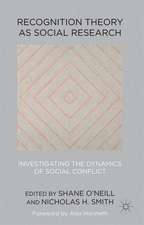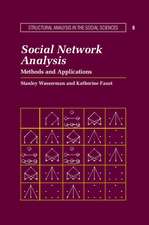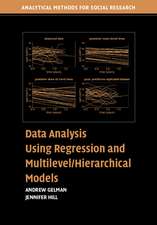Mixed Methods Social Networks Research: Design and Applications: Structural Analysis in the Social Sciences, cartea 36
Editat de Silvia Domínguez, Betina Hollsteinen Limba Engleză Paperback – 6 iul 2014
| Toate formatele și edițiile | Preț | Express |
|---|---|---|
| Paperback (1) | 335.59 lei 6-8 săpt. | |
| Cambridge University Press – 6 iul 2014 | 335.59 lei 6-8 săpt. | |
| Hardback (1) | 471.35 lei 6-8 săpt. | |
| Cambridge University Press – 29 iun 2014 | 471.35 lei 6-8 săpt. |
Din seria Structural Analysis in the Social Sciences
-
 Preț: 411.43 lei
Preț: 411.43 lei -
 Preț: 238.07 lei
Preț: 238.07 lei -
 Preț: 394.00 lei
Preț: 394.00 lei -
 Preț: 232.67 lei
Preț: 232.67 lei -
 Preț: 195.77 lei
Preț: 195.77 lei -
 Preț: 226.46 lei
Preț: 226.46 lei -
 Preț: 289.29 lei
Preț: 289.29 lei -
 Preț: 287.48 lei
Preț: 287.48 lei -
 Preț: 351.15 lei
Preț: 351.15 lei -
 Preț: 338.80 lei
Preț: 338.80 lei - 11%
 Preț: 546.03 lei
Preț: 546.03 lei -
 Preț: 434.92 lei
Preț: 434.92 lei -
 Preț: 286.30 lei
Preț: 286.30 lei -
 Preț: 378.11 lei
Preț: 378.11 lei -
 Preț: 323.65 lei
Preț: 323.65 lei -
 Preț: 334.16 lei
Preț: 334.16 lei -
 Preț: 284.56 lei
Preț: 284.56 lei -
 Preț: 236.40 lei
Preț: 236.40 lei -
 Preț: 349.80 lei
Preț: 349.80 lei -
 Preț: 300.79 lei
Preț: 300.79 lei -
 Preț: 421.39 lei
Preț: 421.39 lei -
 Preț: 284.56 lei
Preț: 284.56 lei -
 Preț: 368.31 lei
Preț: 368.31 lei - 11%
 Preț: 520.83 lei
Preț: 520.83 lei -
 Preț: 277.97 lei
Preț: 277.97 lei -
 Preț: 381.45 lei
Preț: 381.45 lei - 11%
 Preț: 646.96 lei
Preț: 646.96 lei -
 Preț: 250.30 lei
Preț: 250.30 lei -
 Preț: 208.61 lei
Preț: 208.61 lei - 11%
 Preț: 645.26 lei
Preț: 645.26 lei
Preț: 335.59 lei
Nou
Puncte Express: 503
Preț estimativ în valută:
64.23€ • 66.80$ • 53.75£
64.23€ • 66.80$ • 53.75£
Carte tipărită la comandă
Livrare economică 15-29 martie
Preluare comenzi: 021 569.72.76
Specificații
ISBN-13: 9781107631052
ISBN-10: 110763105X
Pagini: 404
Ilustrații: 54 b/w illus. 29 tables
Dimensiuni: 150 x 226 x 25 mm
Greutate: 0.54 kg
Ediția:New.
Editura: Cambridge University Press
Colecția Cambridge University Press
Seria Structural Analysis in the Social Sciences
Locul publicării:New York, United States
ISBN-10: 110763105X
Pagini: 404
Ilustrații: 54 b/w illus. 29 tables
Dimensiuni: 150 x 226 x 25 mm
Greutate: 0.54 kg
Ediția:New.
Editura: Cambridge University Press
Colecția Cambridge University Press
Seria Structural Analysis in the Social Sciences
Locul publicării:New York, United States
Cuprins
Part I. General Issues: 1. Mixed methods social network research: an introduction Betina Hollstein; 2. Social network research Peter J. Carrington; 3. Triangulation and validity of network data Andreas Wald; 4. A network analytical four-level concept for an interpretation of social interaction in terms of structure and agency Roger Häussling; Part II. Mixed Methods Applications: 5. Social networks, social influence, and fertility in Germany: challenges and benefits of applying a parallel mixed methods design Laura Bernardi, Sylvia Keim and Andreas Klärner; 6. Two sides of the same coin: the integration of personal network analysis with ethnographic and psychometric strategies in the study of acculturation Isidro Maya Jariego and Silvia Dominguez; 7. Adaptation to new legal procedures in rural China: integrating survey and ethnographic data Christine Avernius and Jeffrey C. Johnson; 8. Mixing ethnography and information technology data mining to visualize innovation networks in global networked organizations Julia Gluesing, Kenneth Riopelle and James A. Danowski; Part III. New Methodological Approaches Used in Mixed Methods Designs: 9. Fuzzy set analysis of network data as mixed method personal networks and the transition from school to work Betina Hollstein and Claudius Wagemann; 10. Reconstructing social networks through text analysis: from text networks to narrative actor networks Joan Miquel Verd and Carlos Lozares; 11. Give meaning to social networks: methodology for conducting and analyzing interviews based on personal network visualizations José Luis Molina, Isidro Maya Jariego and Christopher McCarty; 12. Simulating the social networks and interactions of poor immigrants Bruce Rogers and Cecilia Menjívar.
Recenzii
'In Mixed Methods Social Networks Research: Design and Applications, Silvia Domínguez and Betina Hollstein provide an inspiring volume with offerings that embrace disciplines and methods from across the social sciences. Its chapters highlight the rich insights that can be gained by adopting fully integrated mixed-method approaches for studying social networks. This transformative book is certain to stimulate a new generation of social network researchers who are comfortable with both ethnographic methods and mathematical models. A very welcome addition to the bookshelf of social network methods texts!' Katherine Faust, University of California, Irvine
'This book should be on every researcher's bookshelf. A pioneering collection on mixed methods, it recognizes that social network analysis is no mere quantitative technique. The book will be of immense relevance to the growing number of qualitative researchers seeking to use network ideas in their research. An international team of experts have provided accessible discussions of powerful and innovative applications of mixed-methods designs that will stand as standard sources for a long time to come.' John Scott, University of Copenhagen
'These informative essays by network researchers from diverse social science fields focus on methodological strategies that bridge the conventional qualitative-quantitative divide. They outline and illustrate five distinct mixed-methods designs - sequential, parallel, embedded, fully integrated, and conversion - each of which offers a purposeful approach to constructing a multi-method study. Beyond articulating the strengths and capabilities of different research methods, the authors illustrate and exemplify the gains in substantive understanding of social network phenomena that can flow from using multiple research techniques in complementary and mutually enriching ways.' Peter V. Marsden, Edith and Benjamin Geisinger Professor of Sociology and Dean of Social Science, Harvard University
'In the age of 'big data', the clever intertwining of qualitative and quantitative methods to yield insight regarding into human behavior becomes ever more important. Mixed Methods Social Networks Research, in its careful consideration of how to design mixed methods research in social networks, is destined to become a well-worn guidebook for students of social networks in the 21st twenty-first century.' David Lazer, Northeastern University
'This book should be on every researcher's bookshelf. A pioneering collection on mixed methods, it recognizes that social network analysis is no mere quantitative technique. The book will be of immense relevance to the growing number of qualitative researchers seeking to use network ideas in their research. An international team of experts have provided accessible discussions of powerful and innovative applications of mixed-methods designs that will stand as standard sources for a long time to come.' John Scott, University of Copenhagen
'These informative essays by network researchers from diverse social science fields focus on methodological strategies that bridge the conventional qualitative-quantitative divide. They outline and illustrate five distinct mixed-methods designs - sequential, parallel, embedded, fully integrated, and conversion - each of which offers a purposeful approach to constructing a multi-method study. Beyond articulating the strengths and capabilities of different research methods, the authors illustrate and exemplify the gains in substantive understanding of social network phenomena that can flow from using multiple research techniques in complementary and mutually enriching ways.' Peter V. Marsden, Edith and Benjamin Geisinger Professor of Sociology and Dean of Social Science, Harvard University
'In the age of 'big data', the clever intertwining of qualitative and quantitative methods to yield insight regarding into human behavior becomes ever more important. Mixed Methods Social Networks Research, in its careful consideration of how to design mixed methods research in social networks, is destined to become a well-worn guidebook for students of social networks in the 21st twenty-first century.' David Lazer, Northeastern University
Descriere
This volume demonstrates the potential of mixed-methods designs for researching social networks and the utilization of social networks for other research. Mixing methods applies to the combination and integration of qualitative and quantitative methods. In social network research, mixing methods also applies to the combination of structural and actor-oriented approaches.
